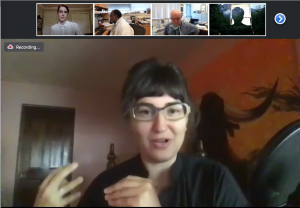This conversation was led by Athena Aktipis, Assistant Professor in the Department of Psychology at Arizona State University and co-Director of The Human Generosity Project. She discussed her new book, The Cheating Cell: How Evolution Helps Us Understand and Treat Cancer.
 Cancer began at the dawn of multicellular life. It arises from cheating in the cellular cooperation that usually defines multicellularity: division of labor, restrictions of cellular proliferation and resources use, controls on cell death and more. Because cancer arises from a breakdown of multicellular cooperation, this means that humans are not alone in their struggle with cancer; cancer affects all multicellular life forms from humans to elephants and from coral to cacti. Multicellular life has evolved to keep cancer under control, through mechanisms like the gene TP53, which detects cellular cheating and responds by halting the cell cycle or initiating apoptosis to protect the organism. Treating cancer effectively also requires an understanding of the evolutionary processes among cells within the body. Cancer cells evolve to overproliferate and overconsume resources inside the body. They also evolve resistance when cancer is treated aggressively. By using evolutionarily informed approach to treatment we can transform cancer from being a disease that threatens our lives to one we can live with, as our multicellular ancestors have for millions of years.
Cancer began at the dawn of multicellular life. It arises from cheating in the cellular cooperation that usually defines multicellularity: division of labor, restrictions of cellular proliferation and resources use, controls on cell death and more. Because cancer arises from a breakdown of multicellular cooperation, this means that humans are not alone in their struggle with cancer; cancer affects all multicellular life forms from humans to elephants and from coral to cacti. Multicellular life has evolved to keep cancer under control, through mechanisms like the gene TP53, which detects cellular cheating and responds by halting the cell cycle or initiating apoptosis to protect the organism. Treating cancer effectively also requires an understanding of the evolutionary processes among cells within the body. Cancer cells evolve to overproliferate and overconsume resources inside the body. They also evolve resistance when cancer is treated aggressively. By using evolutionarily informed approach to treatment we can transform cancer from being a disease that threatens our lives to one we can live with, as our multicellular ancestors have for millions of years.


Comments are closed, but trackbacks and pingbacks are open.